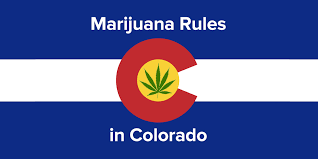Rules promulgated from the 2019 legislative session are the most extensive since retail marijuana was legalized in 2012.
DENVER, Colo. December 31, 2019 — Marijuana rules stemming from the General Assembly’s 2019 legislative session go into effect on January 1, 2020 for all regulated marijuana businesses across Colorado, most notably allowing, for the first time, state licensing of hospitality establishments and the issuance of permits for residential delivery of medical marijuana. Final rules were adopted by the State Licensing Authority on November 5, 2019 after a summer of extensive stakeholder engagement led by the Marijuana Enforcement Division (MED).
“Feedback from our stakeholders through work groups and public comment has always been a MED priority,” said Jim Burack, MED Director. “But this year, we encouraged an even more collaborative approach to rule development where work group participants utilized their experience and expertise within stakeholder teams to engage more directly in the drafting of rule language.”
Highlights of notable key rules that go into effect on January 1 include:
- Marijuana Hospitality Businesses (HB19-1230):
- Creation of two marijuana hospitality business licenses, subject to local jurisdiction approval, including 1) “Marijuana Hospitality Business” license (may be mobile), allowing consumption of marijuana on the licensed premises, and 2) “Retail Marijuana Hospitality and Sales Business” license (cannot be mobile) allowing for the sale and consumption of retail marijuana on the licensed premises.
- MED will maintain a list of approved hospitality businesses on the Division’s website.
- Regulated Marijuana Delivery (HB19-1234):
- Creation of a permit to allow delivery of regulated marijuana to private residences from medical marijuana stores, subject to local jurisdiction approval.
- Delivery to private residences from retail marijuana stores begins on January 1, 2021, also subject to local jurisdiction approval.
- Sunset Regulated Marijuana (SB19-224):
- The Retail Code and Medical Code are integrated to create a single code, which will streamline operations for both regulators and businesses.
-
- Criminal history disqualification provisions are amended so that felony convictions within the past three years will typically preclude licensing as an owner or employee.
- Industrial hemp can be used in the manufacture of marijuana products and sold in retail marijuana stores. Prior to this legislation, the sale of industrial hemp products by licensed marijuana businesses was limited to medical marijuana stores. Beginning July 1, 2020, industrial hemp used by medical and retail marijuana manufacturers and sold in medical and retail stores will be subject to testing and can only be sourced from persons registered with the Colorado Department of Public Health and Environment.
- Retail and medical marijuana stores and hospitality establishments can collect marijuana consumer waste for purposes of reuse and recycling. This includes containers, packages, and cartridges, among other waste components left after the marijuana is consumed.
- Other notable rule changes:
- Vitamin E Acetate, Polyethylene glycol (PEG) and Medium Chain Triglycerides (MCT Oil) are expressly prohibited for use in the manufacture of regulated marijuana concentrate or regulated marijuana products intended for inhalation. Read more here.
- In an effort to further simplify the licensing process, there are now only two (instead of three) license categories for individuals working in the regulated marijuana industry: 1) owner and 2) employee.
To view the Colorado Marijuana Rules, 1 CCR 212-3, in its entirety, please visit: https://www.colorado.gov/pacific/enforcement/med-rules.
SPREAD THE NEWS
COMMENT, Like, Follow & SHARE @I70Scout
CURRENT EDITION
WEATHER & TRAFFIC PUZZLES RECENT NEWS ADVERTISE WITH US
